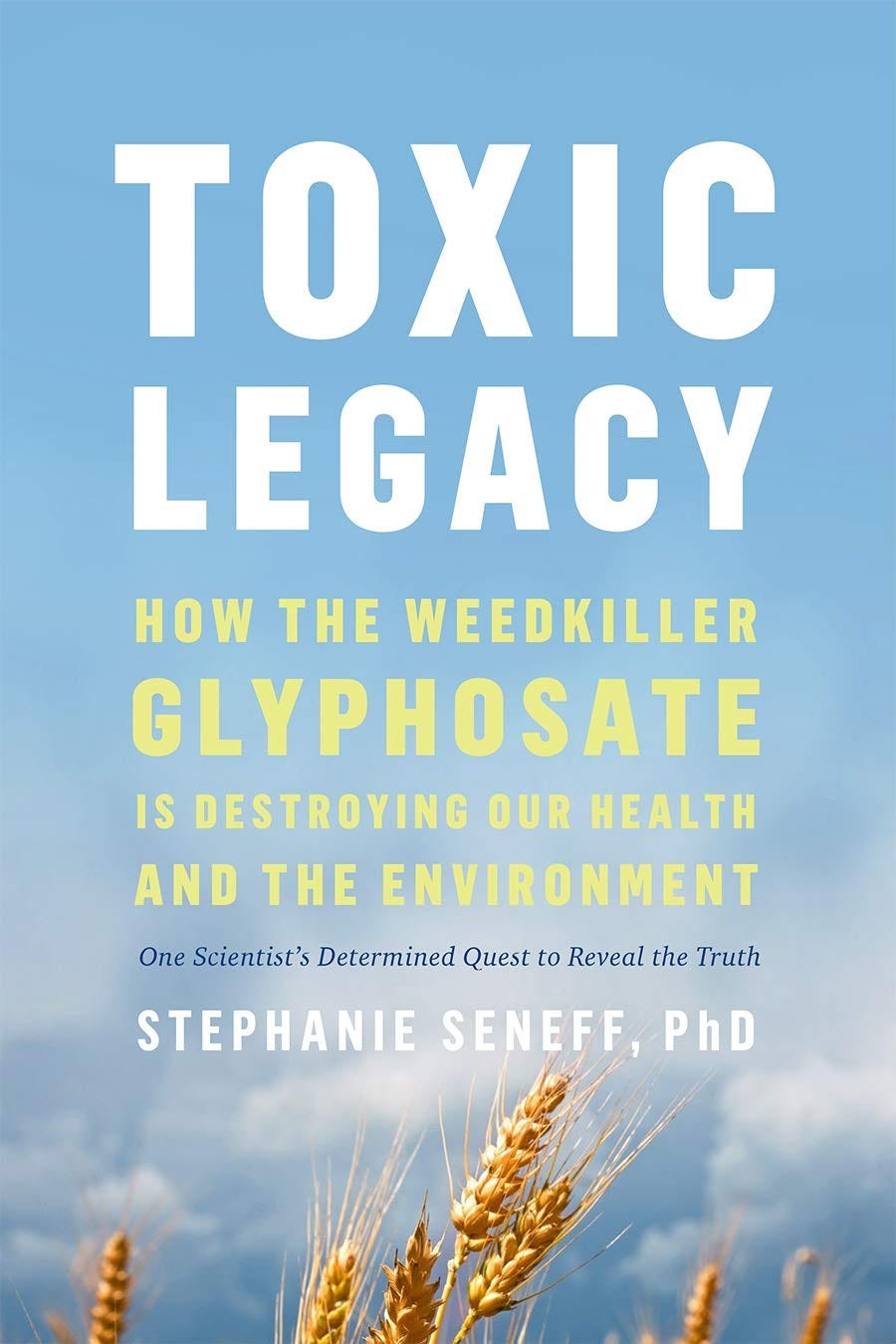Glyphosate, the active ingredient in Roundup, is the weed killer that regenerative farmers, nutritionists, and physicians repeatedly identify as one of the most dangerous agrochemicals commonly used in conventional farming. Since Monsanto first started selling Roundup in 1974, billions of pounds of glyphosate have been sprayed around the world. Beginning in 1996, Roundup’s use skyrocketed following the introduction of genetically modified “Roundup Ready” crops (e.g., soy and corn) resistant to glyphosate. Oats, wheat, barley, and legumes often have high glyphosate levels because they are sprayed with glyphosate before harvest as a desiccant to expedite the drying process. As previously discussed in The Regeneration, rampant application of Roundup inevitably resulted in glyphosate-resistant superweeds, which led farmers to administer more potent pesticide cocktails containing herbicides such as atrazine.
Over the last several years, there have been increasing calls to ban glyphosate due to its negative ecological and health ramifications. While The Regeneration’s earlier analysis of glyphosate emphasized its deleterious environmental effects, this edition primarily focuses on its human health impact and the great lengths Monsanto has gone to silence critiques of glyphosate.
Stephanie Seneff’s Clarion Call Against Glyphosate
Stephanie Seneff, a Senior Research Scientist at the MIT Computer Science and Artificial Intelligence Laboratory, recently published Toxic Legacy: How The Weedkiller Glyphosate is Destroying Our Health and the Environment. She appeared on Dr. Mark Hyman’s The Doctor’s Farmacy Podcast to chronicle glyphosate’s pernicious health effects. During the podcast, Dr. Mark Hyman, who stresses that food is medicine, noted that he was in the 50th percentile for glyphosate levels despite his efforts to eat as cleanly as possible. Seneff emphasizes that glyphosate destroys soil and human microbiomes by killing off many of the most beneficial bacteria (e.g., lactobacillus) that are critical to our health, thereby leading to gut dysbiosis, the persistent imbalance of our gut microbiome. Without adequate beneficial bacteria, pathogens infiltrate our digestive and broader immune systems and create major problems with our guts, which are unable to properly break down proteins. A healthy gut has an extensive intestinal lining that forms a tight barrier regulating what is absorbed in our bloodstream. A “leaky gut” occurs when our gut lining is weakened, thus inducing inflammation within our digestive systems (e.g., celiac disease) and potentially leading to common chronic diseases (e.g., obesity and diabetes) and autoimmune diseases.
Glyphosate’s Interference with the Shikimate Pathway, Metabolic Processes, and Brain Functioning
Not only does glyphosate directly damage our guts’ protective lining, but it also disrupts the Shikimate pathway, the key metabolic route that ultimately forms three essential aromatic amino acids (tryptophan, tyrosine, and phenylalanine) in plants and microorganisms (including our gut bacteria). Thus, as Zach Bush (another leading glyphosate critic) persuasively argues, glyphosate (1) directly injures our gut cells; and (2) eliminates the antidote to leaky guts by blocking our ability to obtain vital amino acids that could form proteins to repair our digestive systems. Significantly, the Shikimate pathway exclusively resides in plants and microorganisms, and we rely on this mechanism in our food and in our gut microbiota to provide us with amino acids that are integral to our well-being. These amino acids are the building blocks for many of our most important biological and neurological active compounds. For example, tyrosine is the initial precursor for neurotransmitters and hormones such as dopamine, norepinephrine, and epinephrine, and tryptophan is the initial precursor for serotonin and melatonin.
Seneff further elucidates that glyphosate disrupts the Shikimate pathway by binding to manganese, which is a catalyst for EPSP synthase, a critical early enzyme in the pathway. According to Seneff, glyphosate suppresses essential enzymes and therefore disrupts thyroid homeostasis, metabolism, liver detoxification, protein synthesis and breakdown, cognitive functioning, immune responses, hormone and B-Vitamin regulation, brain health, sulfur metabolism, and mitochondrial functioning. Indeed, Seneff believes that mitochondrial dysfunction, a “hallmark of many neurological diseases,” may be the most significant effect of glyphosate. Furthermore, Seneff posits that glyphosate can take the place of glycine in the Shikimate pathway and thus wreak havoc on normal protein functioning. Seneff insists that the monstrous application of glyphosate to our most commonly used crops (e.g., oats, wheat, barley legumes, corn, soybean, sugar beets, etc.) has contributed to the rise of autism, Parkinson’s disease, celiac disease, anxiety disorders, thyroid dysfunction, etc.
On top of glyphosate’s dire health impact, Seneff underscores that glyphosate impairs the ability of plants to move carbon into the soil by suppressing Rubisco, a crucial enzyme that fixes atmospheric carbon dioxide into bioavailable sugar molecules via photosynthesis. Seneff further contends that glyphosate causes soil to erode more easily and is playing a key role in global bee colony collapses.
Seneff calls out the EPA for sanctioning glyphosate as safe when there is growing evidence of its substantial contribution to our chronic disease epidemic. Whereas many countries have banned glyphosate, the US is still lagging. Although Bayer recently announced that it will pull glyphosate products (including Roundup) from the U.S. home and garden market beginning in 2023 (“to manage litigation risk and not because of any safety concerns”), it has no known plans to drop its products from our agricultural system.
Carey Gillam’s Quest to Expose Glyphosate Risks and Monsanto’s Attempt to Silence Her
After listening to Seneff’s podcast, I began digging for more information about glyphosate and came across Carey Gillam, an investigative journalist who published Whitewash: The Story of a Weed Killer, Cancer, and the Corruption of Science. In her Broken Brain Podcast with Dhru Purohit, Gillam outlines how Monsanto “forced glyphosate down farmers’ throats” and tried to quash any credible attack upon glyphosate through corruption and misinformation. Monsanto’s glyphosate play wasn’t about giving farmers what they want and feeding the world. Rather, its strategy was all about generating two exponentially increasing revenue streams: (1) selling more Roundup; and (2) selling more specialty patented Roundup Ready seeds. Monsanto marketed glyphosate as a very safe product, and maintained that Roundup was replacing more dangerous weed killers.
Gillam’s work highlights toxicology studies and international research efforts suggesting that glyphosate could “probably” cause cancer, including non-Hodgkin’s lymphoma. Following the tactics used by the tobacco industry, Monsanto tried to smear Gillam’s reputation and discredit her book, as reflected by Monsanto’s internal documents and emails that were uncovered during litigation. Monsanto engaged in ghostwriting scientific papers, paying outside scientists to feign independence and put their names on papers that Monsanto scientists were fully preparing. Monsanto’s ghostwriting tactics extended to op-ed columns, websites like WebMD, and Forbes magazine in a carefully orchestrated strategy to bury any evidence that glyphosate is unsafe.
Following the International Agency for Research on Cancer’s 2015 findings, lawyers around the US launched lawsuits on behalf of tens of thousands of plaintiffs. Gillam’s recent book, The Monsanto Papers: Deadly Secrets, Corporate Corruption, and One Man’s Search for Justice, chronicles the story of Dewayne “Lee” Johnson, the first person to challenge Monsanto over its use of herbicides in court and win. Lee sprayed sports fields and school grounds and some days sprayed upwards of 150 gallons of toxic materials. The jury found that Lee’s exposure to a glyphosate-based herbicide was a substantial factor in causing his rare form of non-Hodgkin’s lymphoma. Lee’s lawsuit catalyzed 120,000 lawsuits against Monsanto/Bayer. Bayer, which acquired Monsanto in 2018, settled the majority of these lawsuits for more than $10 billion in one of the largest US civil settlements ever.
As Gillam notes, glyphosate is the poster child for numerous toxic chemicals prevalent in our food, and the EPA has raised the level of what it deems acceptable over the years. While the USDA Certified Organic seal bans the use of synthetic herbicides like Roundup and hundreds of chemical additives and preservatives, Gillam underscores that organic sales still comprise only a tiny percentage of US food sales given the higher organic premium. Furthermore, because glyphosate leaches into our water supply and soil and gets into the air, even organic products may contain glyphosate that spreads from neighboring farms. That is why it is critical for the government to step in and ban chemicals like glyphosate that a growing cadre of scientists are linking to the rising rates of multiple chronic diseases. And it’s important for more stand-out companies like White Leaf Provisions to go the extra mile in certifying that its products are glyphosate-free.
While certain scientists claim that glyphosate risks are not as extensive as Seneff suggests, one research paper compellingly argues that many industry tests defending glyphosate “were commissioned by the same companies that stand to profit from regulatory authorization. Another relevant factor is that the industry teratogenicity [the ability to cause defects in a developing fetus] tests were on glyphosate, the presumed active ingredient of the herbicide, and not on the herbicide formulations as sold and used, even though studies indicate that the formulations are more toxic for certain endpoints than glyphosate alone . . . it is the responsibility of industry to prove that its products are safe and not the responsibility of the public to prove that they are unsafe.”
I find this final point particularly compelling. Do we honestly believe that Monsanto conducted sufficient research in the early 1970s to gauge the negative health impacts of glyphosate and how it interferes with photosynthesis, biodiversity, and soil health? In the last few decades, has Monsanto devoted more attention to silencing critics and ghostwriting bogus papers or has it conducted the proper due diligence to prove that glyphosate is truly safe? Is there really any doubt that the ultra-processing of our foods and widespread application of pesticides are contributing to our chronic disease epidemic and skyrocketing rates of cancer in children and young people?
There is enough evidence to connect glyphosate and other chemicals to destructive health and ecological outcomes. We must strive for a cleaner food system and push our state and federal governments to ban chemicals like glyphosate. At the same time, governments must increasingly incentivize farmers to follow regenerative practices supporting diverse and resilient ecosystems that effectively control weeds and pests without dousing their land with chemicals. Additionally, consumers should reward farms and brands that avoid agrochemicals and take extra steps to certify that their products are free of dangerous chemicals.
Further Deep Dive
Glyphosate Pretending to be Glycine: Devastating Consequences
Corporate Studies Asserting Herbicide Safety Show Many Flaws, New Analysis Finds
The Chemical Anthropocene: Glyphosate as a Case Study of Pesticide Exposures
Tripp Wall (Trailhead Capital) on the Investing in Regenerative Agriculture and Food Podcast
Disclaimer: The Regeneration Weekly receives no compensation or kickbacks for brand features. We are simply showcasing great new regenerative products.
If you have any products you would like to see featured, please respond to this newsletter or send an email to Kevin(at)soilworksnaturalcapital.com.
The Regeneration is brought to you by Wholesome Meats | Soilworks | Grassroots Carbon| Grazing Lands







"Seneff insists that the application of glyphosate to our crops has contributed to the rise of autism, Parkinson’s disease, celiac disease, anxiety disorders, thyroid dysfunction, etc."
Peer-reviewed studies backing such claims?